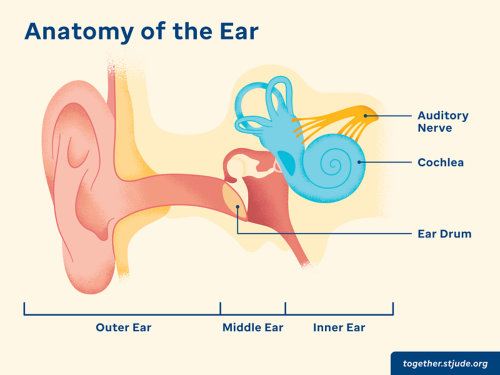What is unilateral hearing loss?
Unilateral hearing loss is when hearing is impaired in only 1 ear.
Possible causes of unilateral hearing loss include:
- Ear infections
- Cranial radiation (radiation treatment to the head)
- A tumor pressing on or near the auditory (hearing) nerve
- Surgery or swelling close to the auditory nerve
- A hard hit on the head
- A hole in the ear drum
Some children are born with a hearing loss or develop hearing loss for unknown reasons. Hearing loss can be temporary or permanent, depending on the cause.
Types of hearing loss
The 3 general types of hearing loss are:
- Conductive hearing loss. This type of hearing loss involves only the outer or middle ear. It does not involve the inner ear or the auditory (or cochlear) nerve, which carries auditory information from the inner ear to the brain. Conductive hearing loss is usually temporary.
- Sensorineural hearing loss. This type involves the inner ear or the auditory nerve or brain. Sensorineural hearing loss is usually permanent. It may be reversible if the hearing loss is caused by a tumor or swelling in the head or brain. Learn more about sensorineural hearing loss.
- Mixed hearing loss. Hearing loss can be both conductive and sensorineural.
How to help children with hearing loss
Patients with hearing loss should have their hearing tested by an audiologist (hearing specialist). Your audiologist can let you know if your child needs a hearing aid or another assistive device.
Learn more about audiology and hearing care.
Most children with unilateral hearing loss do not have problems with their speech or language. They can usually hear and understand other people, but it can be harder in noisy areas or if there are background noises.
You can make it easier for your child to hear and understand what is being said.
In general, when speaking to your child:
- Get your child’s attention before speaking.
- Use words your child knows and use simple sentences.
- If you say something your child does not understand, do not repeat the same thing. Try saying it in a different way.
- Use facial expressions and gestures to add meaning to the words you are saying.
At school and in the classroom:
- Make sure your child has seating accommodations such as sitting in the front of the class. The “good” ear should be close to the teacher and away from distracting noises, such as a hallway or air conditioner.
- Minimize distracting noise inside and outside the classroom.
- Routinely check your child’s speech, language, and academic progress.
- Consider using a personal FM system in school to help your child hear the teacher's voice over other noises. An FM system transmits the voice directly from a teacher’s microphone to the student’s receiver, such as a hearing aid.
Keep your child safe: Your child may have trouble localizing sounds or knowing where sounds are coming from. Teach your child bicycle and traffic safety rules, and make sure they know to be extra careful. It may be harder for your child to hear warning sounds or tell the direction it is coming from.
Ways to protect hearing
It is always important to protect your child’s hearing. It is even more critical when your child already has hearing loss. Take steps to protect your child’s hearing, especially in their “good” ear.
- Avoid loud sounds. Your child should wear earplugs or earmuffs if there are loud noises around. Keep the volume low on toys and electronic devices.
- See a doctor if you think your child has an ear infection.
- Do not put anything in your child’s ear unless instructed by your doctor.
- Be aware that some medicines can damage hearing. These are called ototoxic medicines. Ask your doctor or pharmacist if you are not sure if your child’s medicine is ototoxic. Have your child’s hearing checked often if taking an ototoxic medicine.
- Tell all your child’s doctors about the hearing loss.
- Have your child’s hearing tested once a year by an audiologist. If you think that there has been a change in your child’s hearing (better or worse), get it tested as soon as possible.
Learn how to protect your child’s hearing from loud noises.
